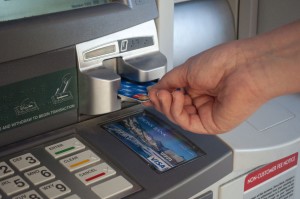As fall draws near, and another semester starts, BYU students are reminded of the painful costs of tuition, books, rent and food. This is the beginning of financial independence for a majority of students and smart spending is a must-know for survival.
A problem is most students don’t even see their money in actual bills anymore. Most students pay for these college expenses with debit or credit cards. One swipes the card and takes home what they need, hardly ever wasting time to pull out money and count out the change due.
Cash has become a thing of the past, and checks a practical joke. Most do banking electronically these days, going into a bank only for the “official stuff.” With all of the hype of “do-it-yourself” banking, students and parents rarely speak with a financial adviser about how to deal with money effectively.
[media-credit name=”Whitney Soelberg” align=”alignleft” width=”300″] [/media-credit]Kristine Kelly, studying public health at BYU, has never stepped foot into a bank before.
[/media-credit]Kristine Kelly, studying public health at BYU, has never stepped foot into a bank before.
“My parents helped me set up my account, and I have always used an ATM or online banking,” Kelly said. “I love that I can focus on school and work. I hate having to waste time in line waiting to do something I could do at home,”
Kelly said she probably needs to talk to a financial adviser because she isn’t aware of what fees are occurring on her accounts.
It turns out, 15 minutes with a financial adviser could save you 15 percent or more in overdraft fees, credit card interest, or ATM fines, to quote a phrase.
Mark Chapman, the Wells Fargo communications manager for Utah, illustrates how students can become more aware of the money they hardly see in their hands.
“I think a huge part of it is financial education,” Chapman said. “People learn their spending habits from their parents, courses, up-bringing, desires, etc. Whatever they learn growing up is essentially how they, too, will spend.”
Chapman continued, saying if you don’t understand how budgeting works, it can be hard if not disastrous to try and stick with it.
“A good bank will offer you free financial education to take advantage of. At Wells Fargo we have ‘hands-on banking,’ which is a free, unbranded program for customers, students even teachers to utilize.” Chapman said. The website for hands on banking is easy to use and is open to everyone, regardless of where they bank at.
According to a recent financial study, people spend the most money using a credit card. Debit cards are not much better. A Dunn & Bradstreet study found that people spend 12–18 percent more using a debit card versus using cash.
Chapman said while that statistic may be true for some people, it is the opposite for others. For some, having cash in hand is up for grabs to go anywhere, and is used with less discretion than a debit card.
“For that reason, it is important that people bank with a bank that lets them pick and choose what works best for them,” Chapman said.
After getting set up with the right financial institution, the next step is becoming aware of cash flow and staying motivated to save. Jacquelyn Bradshaw, an accountant for Ernst & Young and recent BYU graduate, reflected on her financial troubles while in college.
“Money is a good thing and helps make fun happen, but unless you have a budget for that fun, you can easily go overboard.” Bradshaw said.
She said one time during her sophomore year, she didn’t pay attention to her cash flows until it was too late and she had no money left.
“The experience was terrifying. I had no money for food and I could have been evicted. From that point on, I made sure to check my balance at least daily to ensure I had enough funds for the essentials,” Bradshaw said.
Bradshaw continued, encouraging every student to save at least a few dollars each month. Bradshaw said she knows its hard to do in college, but unless you start saving now, it will become near impossible to want to start in the future.
Kelly echoed Bradshaw’s words, stating she recently made a goal to save 10 percent of each paycheck. So far, the experience has been very rewarding.
Making sure credit card information is not stored in browsers saves money and prevents fraud. Chapman added to this tip.
“Whenever you pay for something online, make sure the url reads ‘https://” versus “http://.’ That extra ‘s’ stands for secure, and it means the company is legitimate,” Chapman said. Paying attention to when browsers are secure significantly reduces any risk for fraud.
Building credit is often something college students are not focusing on enough. As many students have only had a line of credit for a few years, it is essential to start now on working towards a higher score on their credit report.
Dr. Jim Brau, a professor of finance at BYU, teaches students how to maximize their credit score.
“If you have a credit card, keep it to a low minimum and pay it off every single month,” Brau said.
If credit cards become a problem, there are other methods to build credit. Brau said students could purchase furniture and finance it at select stores, such as RC Willey.
“Buy the furniture with a zero or low interest rate, and once the loan hits your credit report, just pay it all off. It will show a) you have a loan, b) you paid on time and c) you paid if off,” Brau said.
Brau encouraged students to visit personalfinance.byu.edu, a free resource for students that has advice for all levels of financial advice.




